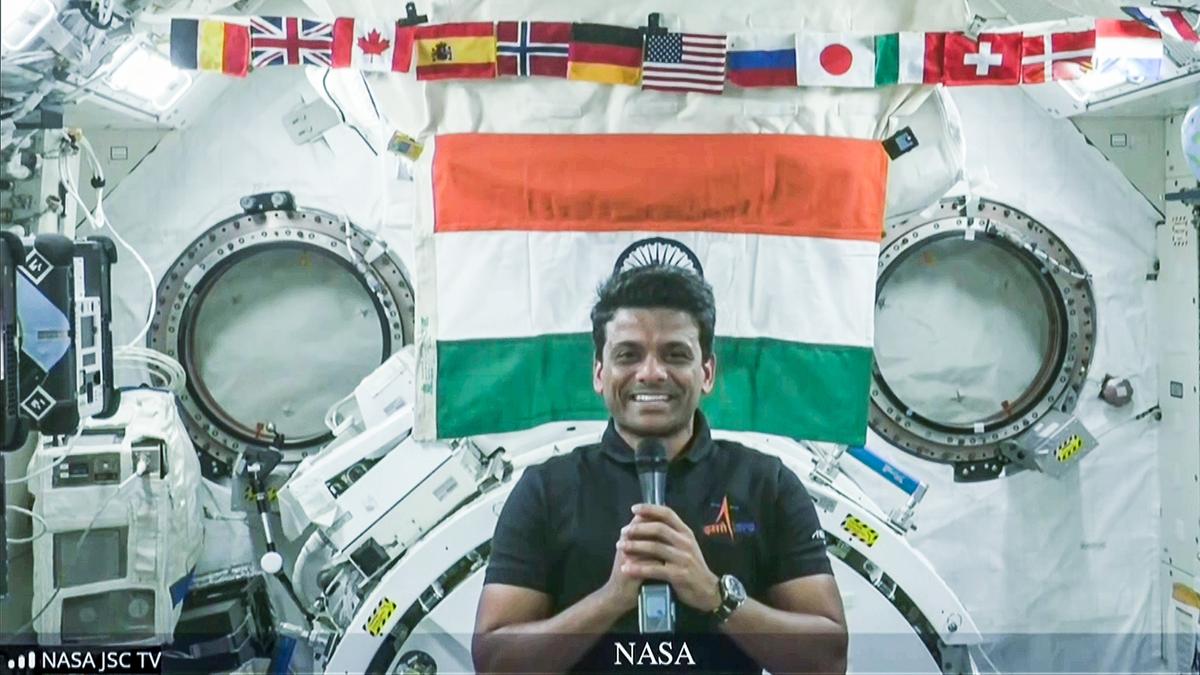After a day off, astronaut Shubhanshu Shukla and others from the Axiom-4 mission on Saturday (July 5, 2025) studied how bones react to microgravity conditions, an experiment that could lead to better treatment of osteoporosis on Earth. FIle
| Photo Credit: ANI
After a day off, astronaut Shubhanshu Shukla and others from the Axiom-4 mission on Saturday (July 5, 2025) studied how bones react to microgravity conditions, an experiment that could lead to better treatment of osteoporosis on Earth.
On the 10th flight day, Shukla also participated in an experiment to monitor radiation exposure on the International Space Station (ISS), which could help better protect astronauts on longer-duration space missions away from Earth.
Lucknow-born Shukla (39) is part of a 14-day mission to the ISS conducted by Axiom Space. Shukla, who has the call sign “Shux”, is the mission pilot, while veteran US astronaut Peggy Whitson is the commander of the mission.
Hungarian Tibor Kapu and Polish astronaut Slawosz Uznanski-Wisniewski are mission specialists.
“Shux deployed samples for the Space Micro Algae investigation. These tiny organisms might one day help sustain life in space, providing food, fuel, and even breathable air. But first, we need to understand how they grow and adapt in microgravity,” Axiom Space said in a statement.
The crew participated in the Bone on ISS experiment, providing insight on how bones deteriorate in space and how they recover once back on Earth.
By analysing biological markers related to bone formation, inflammation and growth, researchers are building a digital twin — a virtual model that can simulate how an astronaut’s bones respond to spaceflight and recovery, Axiom Space said.
“This personalised approach could revolutionise astronaut-health screening, allowing mission planners to predict skeletal risks and tailor countermeasures for each individual. Beyond space, the findings may also lead to better treatments for osteoporosis and other bone-related conditions here on Earth,” it said.
In a separate statement, the Indian Space Research Organisation (ISRO) said Shukla successfully completed the microgravity experiment involving tardigrades on board the ISS.
“The study focussed on their survival, revival, and reproductive behaviour in space. This study will provide valuable insights into the underlying biological mechanisms leading to resilience of extremophile organisms in microgravity environment and has potential applications on Earth, especially in the area of therapeutics,” the ISRO said.
Shukla and other members of the Axiom-4 mission are scheduled to interact with Axiom Space chief scientist Lucie Low on Sunday on the progress of the 60 science experiments planned for the 14-day sojourn to the orbital laboratory.
Shukla also carried out the myogenesis study, which explores the effects of microgravity on human muscle regeneration and is progressing with planned interventions and recording of observations in accordance with the experiment protocol.
In parallel, other Indian experiments for studying selected strains of microalgae and cyanobacteria under space conditions are ongoing, contributing to research on regenerative life-support systems and crew nutrition, the ISRO said.
As part of the Electronic Displays human-research study, the Gaganyatri carried out daily software-based cognitive and interface assessments. The study aims to optimise crew interaction with digital systems in the unique environment of space, the ISRO said.
Published – July 05, 2025 03:41 pm IST
